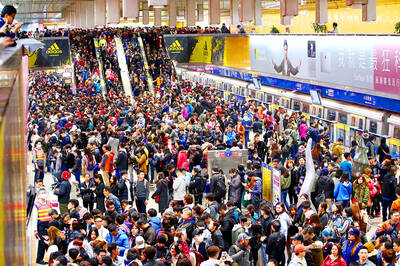The Ministry of Transportation and Communications is planning to press criminal charges to stop what it feels are illegal ride-sharing services offered by Uber Taiwan, ministry sources said yesterday.
Since September last year, the Directorate-General of Highways (DGH) has imposed more than NT$40 million (US$1.22 million) in fines on Uber Taiwan and its drivers for violating the Highway Act (公路法), which bans unlicensed operators of transportation services.
However, those fines have failed to stop the practices, the ministry sources said.
Uber runs transportation services in Taiwan, but has refused to apply for the required licenses and has never paid taxes in Taiwan because its earnings from the services are all booked overseas, according to the ministry.
The DGH is consulting with its lawyers on a plan to stop Uber’s allegedly illegal operations by means of the Criminal Code, under which it is illegal to “induce people into committing crimes,” the ministry sources said.
Under the Highway Act, people managing taxicab transportation services without applying for a business license are subject to a fine of between NT$50,000 and NT$150,000. Though the government seems determined to take legal action against the service, academics have suggested trying to guide it to become a legal entity rather than shutting it down.
Feng Chia University Department of Transportation Technology and Management associate professor Lee Ker-tsung (李克聰) said Uber cannot be eradicated, because it helps to offer consumers access to multiple services and provides a chance for people to supplement their income through a sharing economy.
Uber has defied payment of some administrative fines, in part, because its services receive few complaints from its users, Lee said, adding that the government should try to make Uber pay taxes and operate legally.
National Taiwan Normal University dean of College Management Chen Dun-ji (陳敦基) agreed with Lee, but said Uber should also accept regulation of the service and face the issue of paying taxes and insurance. He also suggested that the government make the taxi industry more competitive by easing regulations on taxi pricing to allow a gap between peak and off-peak hours and differentiate between various classes of taxis.
The government could even guide Uber into becoming a leasing business, which could balance the competitive environment between Uber and taxi drivers, Chen said.
Since Uber entered the Taiwanese market in 2013, the ministry has held repeated talks with Uber representatives over registering their business legally as a transportation services provider, but Uber has resisted because it considers itself an information technology services provider, according to the ministry.
Highway authorities have imposed NT$35 million in fines on Uber and NT$11.5 million in fines on its drivers, of which Uber has paid NT$30.20 million of its own fines and NT$8.59 million of its drivers’ fines, according to the DGH.
It refused to pay several fines imposed between Jan. 21 and Jan. 26, and the Taipei High Administrative Court upheld the move after ruling that 19 of the 21 citations, accounting for NT$2.05 million in fines, failed to state clearly where and when the violations occurred.
The court added that the DGH does not have the authority to shut down Uber’s operations under the Highway Act, since the company’s registered businesses do not fall under the terms of the act.
The highway authority is planning to appeal the ruling, saying it lost on procedural grounds rather than because Uber was innocent, and that it plans to present the necessary documents to show that the fines were indeed legitimate.

People can take the Taipei MRT free of charge if they access it at Nanjing Sanmin Station or Taipei Arena Station on the Green Line between 12am and 6am on Jan. 1, the Taipei Department of Transportation said on Friday, outlining its plans to ease crowding during New Year’s events in the capital. More than 200,000 people are expected to attend New Year’s Eve events in Taipei, with singer A-mei (張惠妹) performing at the Taipei Dome and the city government’s New Year’s Eve party at Taipei City Hall Plaza, the department said. As people have tended to use the MRT’s Blue or

Civil society groups yesterday protested outside the Legislative Yuan, decrying Chinese Nationalist Party (KMT) efforts to pass three major bills that they said would seriously harm Taiwan’s democracy, and called to oust KMT caucus whip Fu Kun-chi (傅?萁). It was the second night of the three-day “Bluebird wintertime action” protests in Taipei, with organizers announcing that 8,000 people attended. Organized by Taiwan Citizen Front, the Economic Democracy Union (EDU) and a coalition of civil groups, about 6,000 people began a demonstration in front of KMT party headquarters in Taipei on Wednesday, organizers said. For the third day, the organizers asked people to assemble

Taipei is participating in Osaka’s Festival of Lights this year, with a 3m-tall bubble tea light installation symbolizing Taiwan’s bubble tea culture. The installation is designed as a bubble tea cup and features illustrations of Taipei’s iconic landmarks, such as Taipei 101, the Red House and North Gate, as well as soup dumplings and the matchmaking deity the Old Man Under the Moon (月下老人), affectionately known as Yue Lao (月老). Taipei and Osaka have collaborated closely on tourism and culture since Taipei first participated in the festival in 2018, the Taipei City Department of Information and Tourism said. In February, Osaka represented

Taiwanese professional baseball should update sports stadiums and boost engagement to enhance fans’ experience, Chinese Professional Baseball League (CPBL) commissioner Tsai Chi-chang (蔡其昌) told the Liberty Times (sister paper of the Taipei Times) in an interview on Friday. The league has urged Farglory Group and the Taipei City Government to improve the Taipei Dome’s outdated equipment, including relatively rudimentary television and sound systems, and poor technology, he said. The Tokyo Dome has markedly better television and sound systems, despite being 30 years old, because its managers continually upgraded its equipment, Tsai said. In contrast, the Taipei Dome lacked even a room for referees